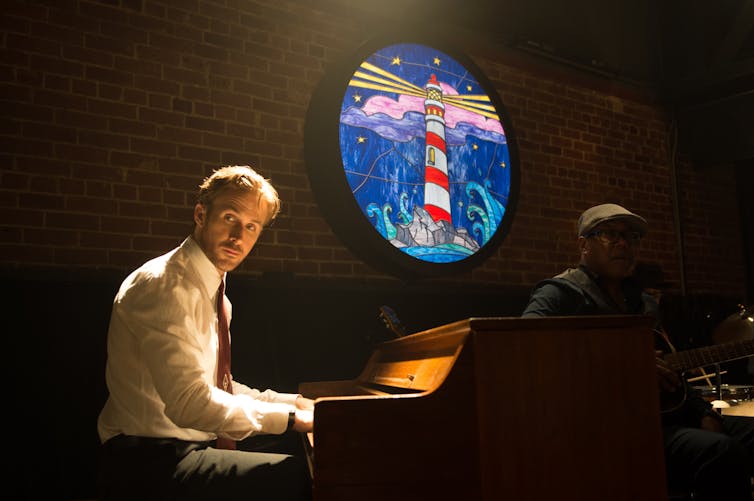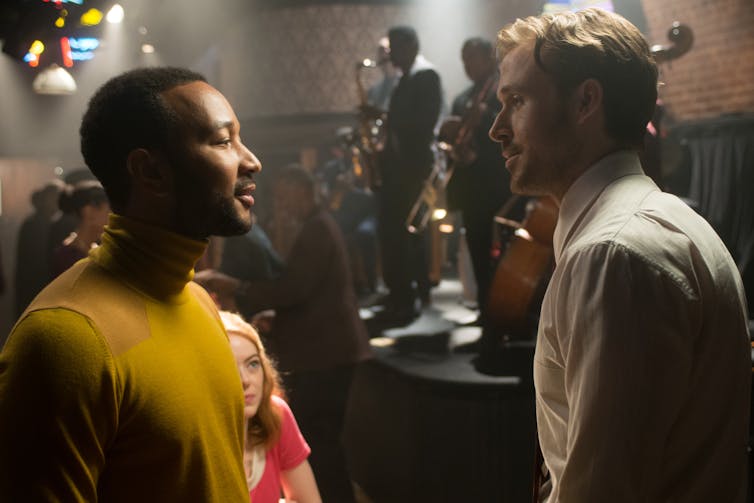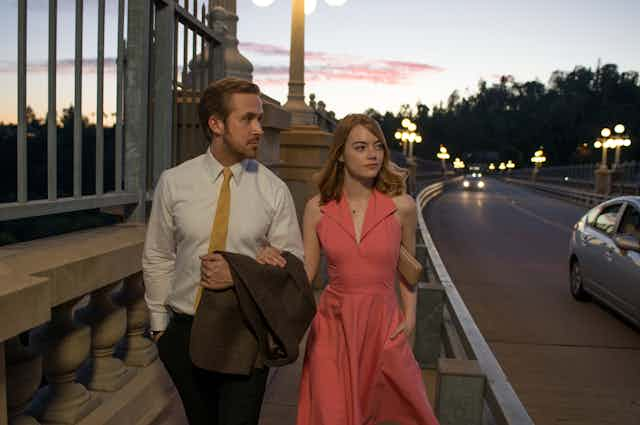La La Land deserves its record-breaking 14 Oscar nominations, I now realise. When I saw the movie, I wasn’t blown away. A pleasant entertainment, with a pretty central couple and some nice frocks. Two actors dancing like the celebrity winners of Strictly Come Dancing and singing like cruise-ship karaoke. You applaud their efforts and can, to an extent, understand the critical acclaim. We need pleasant distractions right now, in the face of Trump and Brexit. We need nostalgia. I didn’t think it deserved the five star reviews, but I appreciate that people enjoy escapism, especially in a time like this.
But I’ve changed my mind. La La Land deserves its nominations and more: it deserves to win Best Picture. Because it isn’t escapism, it’s a story for our age. Ryan Gosling, who pluckily spent three months learning piano to play the protagonist, is the perfect hero in a year when the new president of the United States can take over with no training. His reality-show-standard song and dance routines are perfectly suited to this new era, when a mediocre businessman and second-rate television celebrity can become Commander-in-Chief. If Trump’s Education Secretary can’t write grammatically or answer questions on basic policy, how can we criticise an actor for less-than-perfect performances? Our current culture doesn’t just excuse amateurs, it elevates them to the highest roles.

I thought La La Land borrowed its best scenes from earlier, superior musicals; I may have been technically correct, but I was still wrong. When commercial cinema is saturated with reboots and sequels, La La Land’s pastiche of An American In Paris, Singin’ In The Rain and so many others counts as originality. At least it cast actors who are still alive, rather than constructing a CGI simulation of Fred Astaire. At least it patched its borrowed moments together into a kind of story, copying and pasting them onto its cute contemporary narrative rather than just offering a best-of clip show. That’s surely all we can wish for, in a week when President Trump’s inaugural address included an uncited quotation from a Batman villain.
Some have claimed that La La Land appropriates the black art form of jazz, with Gosling in the white saviour role as its purist champion. But what could be more 2017 than a movie that celebrates mansplaining and whitewashing, that has Gosling talking loudly over older, African American musicians to impress his date, and then shows them nodding appreciatively, grateful for his support? La La Land’s approach to jazz is surely acceptable in a year when Melania Trump got away with delivering a speech seemingly plagiarised from Michelle Obama.
Meanwhile, John Legend’s marginalised appearance as Gosling’s one black friend, who begs him to join a band then sells out the genre with his tacky commercialism, perfectly suits an Academy Awards list that congratulates itself on avoiding “Oscars So White” controversy, yet which nominates white men and women over people of colour in the Best Actor/Actress category by a ratio of 4:1.

I had one remaining reservation about La La Land, when I heard it praised as a pioneering new musical, poised to rejuvenate the genre. La La Land opens like a musical, sure, with a big opening number by the whole company – including minor roles for people of colour who disappear after this scene – and continues briefly in that vein, with old-fashioned movie montages and Emma Stone’s roommates dancing around the apartment like the girls in Sweet Charity and West Side Story. But after the next routine, What A Lovely Night, and the first date (City of Stars), the movie gives up on its genre and largely becomes an indie flick with occasional songs.
The opening mode, where characters sing as readily as speak and break unthinkingly into dance, is almost forgotten: compare the relatively realist middle section of La La Land with West Side Story, where the songs and choreography are regular punctuation, an alternative expressive language that the cast can’t resist slipping into when emotions run high. Most of La La Land’s spectacle is in the trailer, edited into enticing glimpses; in the movie itself, these fantasy moments are paced out, with long stretches between them.
But on second thoughts, I’ve realised that a musical-that-isn’t-a-musical, hailed as the best musical of the decade in a decade with barely any musicals, is just what we need this year, in our post-truth era of alternative facts, where a president who lost the popular vote can boldly lie about things we all saw with our own eyes. A flattering love letter to Hollywood, its film industry and its cinema history, rewarded by an academy whose job it is to celebrate Hollywood, its film industry and its cinema history; what could be more perfectly circular, more self-congratulatory and more suited to the time?
La La Land already plays like an awards show, before it’s won any Academy Awards – it’s a tribute reel, like one of those clever end-of-ceremony acts where Neil Patrick Harris does a song and dance and brings the house down. It’s a white male American dream, a story where the alternate version of what happened to the characters is just as persuasive and powerful, and a lot more glamorous, than what we just saw happening. It’s La La Land.
My mistake was in thinking that this was a made-up world. But we are living in La La Land. It deserves to win bigly at the Oscars: until we all wake up, this is the Best Picture we deserve.

